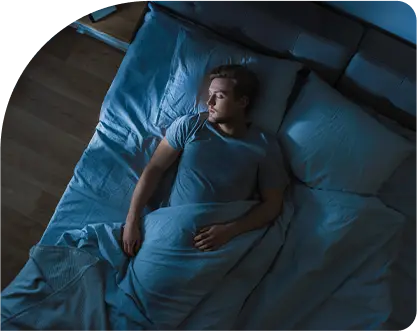The Effects of Caffeine on Your Sex Life
Published: 2024-10-03
 Updated: 2025-02-04
Updated: 2025-02-04
4 mins
Caffeine is a part of everyday life for millions of people — whether it’s that morning cup of coffee, an afternoon energy drink, or a midday soda. Its stimulating effects on energy and focus are well-known, but what about its impact on your sexual health? Can caffeine really influence sexual performance, or even help with erectile dysfunction? While the science is still evolving, there are some interesting findings that suggest caffeine might have a role to play.
Let’s explore the link between caffeine and sexual function, specifically its potential effects on ED.

What is Erectile Dysfunction?
Erectile dysfunction is the inability to achieve or maintain an erection sufficient for sexual intercourse. While it’s often linked to blood flow problems, ED can result from a range of physical and psychological factors. For an erection to occur, the muscles in the penis must relax, and blood vessels must widen, allowing more blood to flow into the area.
This process is intricate, and any disruption — whether caused by medical conditions like diabetes or cardiovascular issues or by mental health factors like stress or anxiety — can affect sexual performance.
While addressing the underlying causes of ED is the most effective treatment, prescription medications like Viagra and Cialis work by improving blood flow to help maintain erections.
Does Caffeine Affect Erectile Dysfunction?
Caffeine is a natural stimulant found in coffee, tea, energy drinks, and even some medications. It works by stimulating the central nervous system, blocking the effects of adenosine (which makes you feel sleepy), and increasing levels of adrenaline and norepinephrine.
This combination boosts energy, alertness, and even blood flow — leading many to wonder whether caffeine could help with ED.
Here’s what we know so far…
Positive effects of caffeine on sexual function
Caffeine has been shown to promote blood flow by relaxing arteries and improving circulation. Additionally, coffee contains antioxidants, anti-inflammatory compounds, and polyphenols, which may support cardiovascular health. Since proper blood flow is essential for erections, it’s reasonable to think that caffeine could have some benefit for men experiencing mild ED.
A study involving more than 3,700 men found that those who consumed moderate amounts of caffeine (85 to 303 milligrams daily, roughly one to three cups of coffee) were less likely to report ED. Even men with risk factors like obesity or high blood pressure experienced fewer erectile issues with moderate caffeine intake. In fact, the study showed that men who drank two to three cups of coffee daily had a 39% to 42% lower chance of experiencing ED.
This single study suggests that moderate caffeine intake could provide some protection against ED, though overall research remains mixed.
However, the study found no significant link between caffeine consumption and ED, though men who drank four or more cups of decaf coffee showed a higher risk of ED — possibly due to other health factors like smoking or obesity.
Potential negative effects of caffeine on sexual function
However, this doesn’t mean that caffeine is a cure-all for men with ED. In some cases, it can worsen anxiety, which is a significant psychological factor in ED. Caffeine also increases cortisol (a stress hormone), which can disrupt the production of testosterone and other hormones that support sexual function. Chronic stress and high cortisol levels are linked to reduced libido and erectile problems.
Tired of insomnia?
Explore prescription medications tailored to help you get better sleep.
Get Started
Does Sleep Impact Sexual Function?
A lack of sleep can significantly impact erectile function. Sleep deprivation disrupts the body's hormonal balance, particularly by lowering testosterone levels, which are critical for maintaining sexual health and erectile function. Inadequate sleep is also linked to an increase in stress levels, which can elevate cortisol production, further inhibiting sexual performance. Additionally, poor sleep quality or duration may lead to conditions like obesity, hypertension, and cardiovascular issues – all of which are risk factors for ED.
Caffeine use can both help and hinder this process. On one hand, caffeine is a stimulant that can temporarily boost energy and alertness, potentially helping someone feel more awake after a bad night’s sleep. On the other hand, excessive caffeine consumption, especially later in the day, can disrupt sleep patterns, exacerbating sleep deprivation and contributing to ED indirectly.
A cycle of poor sleep and caffeine reliance can create long-term problems for both sexual health and overall well-being. For optimal sexual function, managing both sleep quality and caffeine intake is crucial.
How Rex MD Can Help
While caffeine might offer some benefits for sexual performance, especially when consumed in moderation, it’s not a reliable treatment for erectile dysfunction. The research remains inconclusive, and caffeine’s effects on ED vary depending on individual factors like overall health, mental well-being, and lifestyle habits.
For men struggling with ED, addressing the root causes — whether through lifestyle changes, managing anxiety, or using prescription medications — remains the best approach. If ED is affecting you regularly, caffeine alone won’t be enough.
Fortunately, telehealth options like Rex MD make it easier than ever to access ED treatments like Viagra or Cialis from the comfort of your home, after consulting with a licensed physician.












 Medically reviewed by David Culpepper, MD
•
Medically reviewed by David Culpepper, MD
•

